|
|
|
Sort Order |
|
|
|
Items / Page
|
|
|
|
|
|
|
| Srl | Item |
| 1 |
ID:
108358
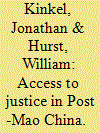

|
|
|
|
|
| Publication |
2011.
|
| Summary/Abstract |
Since the upheaval of the Cultural Revolution decade (1966-1976), post-Mao China has witnessed a sustained period of unprecedented legal reform. Criminal prosecutions and citizen lawsuits against the government, because they pit individual litigants against the authoritarian Chinese state, are two politically significant areas of law. We examine and critically assess the sociolegal scholarship on criminal and administrative legal reform as it has developed over the past few decades, with special attention to shifts in the conventional wisdom regarding legal reform and political liberalism in China and elsewhere. Additionally, we offer both theoretical and empirical suggestions for enhancing the explanatory power of sociolegal research in China.
|
|
|
|
|
|
|
|
|
|
|
|
|
|
|
|
| 2 |
ID:
090219
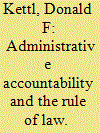

|
|
|
|
|
| Publication |
2009.
|
| Summary/Abstract |
In June 2008, the U.S. Food and Drug Administration rocked the food industry-and food lovers-with its warning about tainted tomatoes. Consumers in New Mexico and Texas were contracting a rare, sometimes fatal strain of salmonella and the FDA feared that salmonella contamination from tomatoes was the cause. In the weeks that followed, a major outbreak spread across the country and worried consumers abandoned tomatoes. Fourth of July cookouts were not the same, and BLT lovers complained that their favorite sandwich was impossibly dry. By the end of July, the outbreak had infected more than 1,200 persons in 42 states.
|
|
|
|
|
|
|
|
|
|
|
|
|
|
|
|
| 3 |
ID:
164373
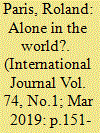

|
|
|
|
|
| Summary/Abstract |
Canada has found itself in serious diplomatic disputes over the past year with Saudi Arabia and China. The Saudis took issue with the Canadian foreign minister’s call to release human rights activists from prison, whereas China was angry at Canada’s arrest of a senior Chinese executive on an extradition request from the United States. These incidents should not be viewed as isolated aberrations. Authoritarian regimes seem increasingly emboldened to lash out at countries that displease them, including allies of the United States. But Ottawa has succeeded in rallying considerable international support for its position in the China dispute, suggesting that while Canada may be exposed, it is not destined to be alone
|
|
|
|
|
|
|
|
|
|
|
|
|
|
|
|
| 4 |
ID:
162595
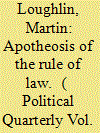

|
|
|
|
|
| Summary/Abstract |
In 1885 A.V. Dicey identified the rule of law as a key principle of British constitutional law. Presenting it both as a product of English common law method and an expression of classical liberalism, Dicey's concept lingered on into the twentieth century but mainly as a contentious ideological doctrine or simply as a vague rhetorical slogan. During the last fifty years, however, the concept has been revived, recrafted, relocated and reified. The rule of law has become a universal trope, albeit with a range of contestable meanings. This article traces this development, showing how it has been converted into a phrase of considerable political potency not only domestically but also in the international arena.
|
|
|
|
|
|
|
|
|
|
|
|
|
|
|
|
| 5 |
ID:
141777
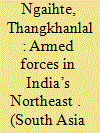

|
|
|
|
|
| Summary/Abstract |
More than 60 years of de facto military rule through the Armed Forces (Special Powers) Act (AFSPA) 1958 in India’s northeast has engendered neither stability nor peace. Problems regarding the impunity of violence and crime, official corruption and the virtual collapse of the rule of law continue, but the Act remains in operation. This article attempts to reframe the debates on the AFSPA in terms of its necessity by turning the necessity argument on its head and arguing that the secessionist insurgencies which were originally used to justify the Act have actually long ceased to exist. Since the principle of existential necessity that provided a fig leaf to the Act no longer applies, its continued application needs to be re-examined. It is further argued that the Indian military’s increasing clout in internal security policy-making may have grave implications for Indian democracy itself, with negative impacts on the rule of law and in relation to safe inclusion strategies for India’s northeast.
|
|
|
|
|
|
|
|
|
|
|
|
|
|
|
|
| 6 |
ID:
192141
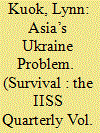

|
|
|
|
|
| Summary/Abstract |
Many Asian governments regard Russia’s war with Ukraine as a distant event with limited impact on the region, beyond rising food and energy prices and possibly increasing the risk of China attacking Taiwan. But the war has strained the rule of law and is entrenching ideological divisions, introducing unnecessary complexity into alliances and partnerships. Asian governments should be alert to the negative implications of these developments for regional peace and security. For them to condemn Russia’s invasion of Ukraine and defend the rule of law would not be to blindly support the West, and would be entirely consistent with their national interests. The West, for its part, should avoid worsening geopolitical fault lines. To this end, the United States might refrain from characterising great-power competition as a battle between autocracies and democracies, and from painting China and Russia with the same broad ideological brush.
|
|
|
|
|
|
|
|
|
|
|
|
|
|
|
|
| 7 |
ID:
114762
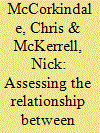

|
|
|
|
|
| Publication |
2012.
|
| Summary/Abstract |
In this article, the authors will consider a very narrow yet spectacularly important aspect of the rule of law: its place in a constitution-the constitution of the United Kingdom-in which supremacy rests not with the constitution as a document to be interpreted by a constitutional court, but with the legislature itself. While traditionally the supremacy of the Crown in Parliament has meant that British courts have had no right to set aside even the most oppressive legislation, recent extra-judicial writings and obiter dicta in case law have been indicative of a shift in the judicial mood. In light of these developments, the paper will ask: Where does the relationship between the supremacy of the Crown in Parliament and the rule of law stand now? Where might that trajectory take us? And what might be done to reconcile the two?
|
|
|
|
|
|
|
|
|
|
|
|
|
|
|
|
| 8 |
ID:
073641
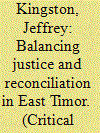

|
|
|
|
|
| Publication |
2006.
|
| Summary/Abstract |
As East Timor emerges from a long Indonesian nightmare, it is seeking to balance the agendas of justice and reconciliation. The verdict on justice for East Timor is one of disappointment. The main obstacle to accountability is Indonesia, abetted by an international community that seeks its assistance in the "war on terror." East Timor's leaders have emphasized reconciliation while promoting a healing process and good governance. Recent violence reveals just how difficult this task remains. The hybrid tribunal established in East Timor by the UN was once heralded as an important innovation in transitional justice, avoiding the high cost and lengthy proceedings of other international tribunals. However, the tribunal has been unable to hold accountable those who bear the greatest responsibility for outrages committed against Timorese and defendants did not get fair trials or competent defense. A truth commission report released in December 2005, Chega! (Enough), emphasizes justice and reparations. The political leadership soft peddles justice because they believe this makes more sense and will better serve the people. Indonesians are now being given a chance to testify in front of the Commission of Truth and Friendship (CTF), but concern is widespread concern that the CTF emphasizes reaching closure, has no judicial mandate, and only ensures impunity for ranking perpetrators. Indonesia and East Timorese can regain dignity and move beyond their shared tragedy through a process of reconciliation that is based on justice and atonement. Germany shows this is possible; Japan, that it is difficult and problematic if neglected.
|
|
|
|
|
|
|
|
|
|
|
|
|
|
|
|
| 9 |
ID:
119092
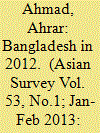

|
|
|
|
|
| Publication |
2013.
|
| Summary/Abstract |
The year 2012 began well for Bangladesh. Economic performance was impressive, and there were some notable political developments, such as the starting of the War Crimes Trial. However, corruption remained a pressing issue, the rule of law and human rights in the country became increasingly tenuous, and the political environment continued to be turbulent and uncertain. Moreover, issues regarding the country's relationship with both India and the U.S. were poorly resolved.
|
|
|
|
|
|
|
|
|
|
|
|
|
|
|
|
| 10 |
ID:
067249
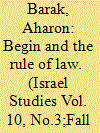

|
|
|
| 11 |
ID:
166095
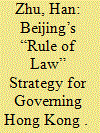

|
|
|
|
|
| Summary/Abstract |
This paper examines the evolution of legal strategies that the central government has used in managing Hong Kong affairs in the past three decades. It demonstrates that the Beijing government appears to have successfully employed the tactic of “legalisation without democratisation” to neutralise political resistance, to resolve thorny issues, and to stifle pro-independence voices. However, as Beijing’s legal strategies for Hong Kong have become more hands-on and assertive, the flaws and instrumentalism of Chinese-style “rule of law” have become increasingly salient, giving rise to deepening conflicts with the Hong Kong common law system. Legalisation without democratisation has given rise to a worrying trend of rising authoritarian legalism in Hong Kong.
|
|
|
|
|
|
|
|
|
|
|
|
|
|
|
|
| 12 |
ID:
113812


|
|
|
|
|
| Publication |
2012.
|
| Summary/Abstract |
Over recent decades a judicialization process of international dispute settlement procedures has taken place. Yet, the judicialization of procedures remains meaningless if the procedures are not used and accepted by disputing states in practice. Prominent theoretical approaches point to different conditions under which this is to be expected. Realism emphasizes the international distribution of power, institutionalism stresses the importance of the institutional design of international dispute settlement procedures, and liberalism points to the domestic institutional setting of the participating states. The article confronts these theoretical expectations with states' actual dispute settlement behavior in the international trade regime, the United Nations Security Council, the European human rights regime and the regime on the protection of endangered species in the 1970s/80s and 1990s/2000s, respectively. Its main finding is that, compared to realism and liberalism, institutionalism fares better in explaining the judicialization of states' dispute settlement behavior.
|
|
|
|
|
|
|
|
|
|
|
|
|
|
|
|
| 13 |
ID:
188900
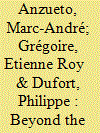

|
|
|
|
|
| Summary/Abstract |
During the 2021 mass protests in Colombia, and while international calls for the Colombian government to respect human rights were intensifying, Canada’s position remained somewhat ambiguous. Part of Canada’s ambiguity can be explained by a simplistic characterization of Colombia as a “weak state.” This article assesses Canada’s bilateral relationship by historizing the development of Colombia’s governance in the key overlapping sectors of security, human rights, and natural resources. From extensive fieldwork, we distinguish two competing rationalities based on the articulation of the notions of “conflict” and “dissent” with the notion of the “rule of law.” We believe that Canada’s bilateral relation with Colombia in the last decades has overlooked the contradictions that exist between democratizing rationalities and antipolitical rationalities. As a result, Canada’s foreign policy has been based on an overly simplistic conception of the relationship between development, security, and the rule of law.
|
|
|
|
|
|
|
|
|
|
|
|
|
|
|
|
| 14 |
ID:
188910
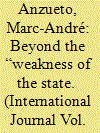

|
|
|
|
|
| Summary/Abstract |
During the 2021 mass protests in Colombia, and while international calls for the Colombian government to respect human rights were intensifying, Canada’s position remained somewhat ambiguous. Part of Canada’s ambiguity can be explained by a simplistic characterization of Colombia as a “weak state.” This article assesses Canada’s bilateral relationship by historizing the development of Colombia’s governance in the key overlapping sectors of security, human rights, and natural resources. From extensive fieldwork, we distinguish two competing rationalities based on the articulation of the notions of “conflict” and “dissent” with the notion of the “rule of law.” We believe that Canada’s bilateral relation with Colombia in the last decades has overlooked the contradictions that exist between democratizing rationalities and antipolitical rationalities. As a result, Canada’s foreign policy has been based on an overly simplistic conception of the relationship between development, security, and the rule of law.
|
|
|
|
|
|
|
|
|
|
|
|
|
|
|
|
| 15 |
ID:
152813
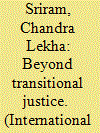

|
|
|
|
|
| Summary/Abstract |
Transitional justice measures are frequently expected to help promote peace in conflict-affected countries, through measures that rely heavily upon legal or legalized processes such as trials and commissions of inquiry. They are also often expected to influence or promote reform in legal processes and institutions, including the judiciary, the constitution, and legislation, in ways that are expected to help promote peace in future post-conflict states. However, not only is the evidence of the role of law in promoting peace through transitional justice a mixed one, but more importantly, the emphasis on transitional justice often overlooks the ways in which law is expected to play a role in promoting peace more broadly and in ways intertwined with transitional justice, through rule of law promotion, often by international actors, and through peace agreements that include specific institutional and governance measures, including power-sharing arrangements. These rule of law and governance measures similarly have a mixed record with regard to their effects for either short- or long-term peace. Closer analysis of the role of law and legalized mechanisms in producing or supporting peace is needed, including analysis of the types of law and mechanisms deployed. Drawing on fieldwork in Sierra Leone, Uganda, Colombia, Kenya, Sri Lanka, and Sudan, among others, this paper will elaborate on the challenges of using law for peace via governance and rule of law measures, as well as through transitional justice.
|
|
|
|
|
|
|
|
|
|
|
|
|
|
|
|
| 16 |
ID:
146099
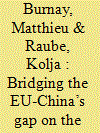

|
|
|
|
|
| Summary/Abstract |
As the European Union (EU) and the People’s Republic of China (PRC) celebrate 40 years of bilateral relations, the partnership continues to develop inter alia with the launch of a new Legal Affairs Dialogue, announced during the 17th EU-China summit (June 2015). As Rule of Law approaches greatly differ between the PRC and the EU and contain unbridgeable conceptual gaps, the new Legal Affairs Dialogue might further contribute to changes in the EU’s strategy of external Rule of Law, faced with the PRC’s own narrative and approach to the Rule of Law. On the other hand, the new dialogue might offer room for agreement and convergence on various global, bilateral and domestic levels. Recent domestic adjustments in the PRC and a manifest interest in reforming its legal system at a time when the EU is itself re-thinking its strategy of external rule of law offers a great potential for significant exchanges and an opportunity to bridge the Rule of Law gap between the PRC and the EU.
|
|
|
|
|
|
|
|
|
|
|
|
|
|
|
|
| 17 |
ID:
146093


|
|
|
| 18 |
ID:
086813


|
|
|
|
|
| Publication |
2009.
|
| Summary/Abstract |
Before the violence came, Margaret Atieno Okoth sold cabbage six days a week at a cramped stall in Nairobi's Toi market, alongside vendors selling everything from second-hand shoes to bicycle parts.
|
|
|
|
|
|
|
|
|
|
|
|
|
|
|
|
| 19 |
ID:
072986
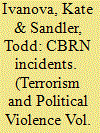

|
|
|
|
|
| Publication |
2006.
|
| Summary/Abstract |
This article investigates the relationship between regime characteristics and the likelihood of chemical, biological, radiological, and nuclear (CBRN) terrorist incidents. Odds ratios establish that democratic ideals-democratic rule, strong rule of law, and honest regimes-are associated with more CBRN incidents. Failed states may be where some terrorist groups form or take refuge, but these states have not been the venue of choice for CBRN incidents. Religious (cults and fundamentalists) and nationalist/separatist groups are not more likely than others to engage in CBRN attacks. To date, indiscriminate CBRN attacks are as likely as discriminate attacks to cause casualties. Transnational terrorist groups are less adept than others in concealing their acquisition of CBRN substances. For some regressions, democratic rule and strong rule of law are positive determinants of CBRN incidents.
|
|
|
|
|
|
|
|
|
|
|
|
|
|
|
|
| 20 |
ID:
193475
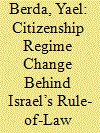

|
|
|
|
|
| Summary/Abstract |
This article delineates the relations between the judicial overhaul launched by Israel’s right-wing government in 2023 and the mechanisms of Israel’s control over Palestinians, demonstrating that they are two parts of a regime change. The essay traces a series of changes in Israel’s citizenship regime the past decade: the enactment of an anti-terrorism law and a nation-state law that defined the exclusive right of Jews to self-determination in Israel; the domestic application of surveillance and control practices developed in the occupied territories; and finally legislation allowing the revocation of Palestinians’ citizenship and the de facto annexation of the occupied territories.
|
|
|
|
|
|
|
|
|
|
|
|
|
|
|
|
|
|
|
|
|